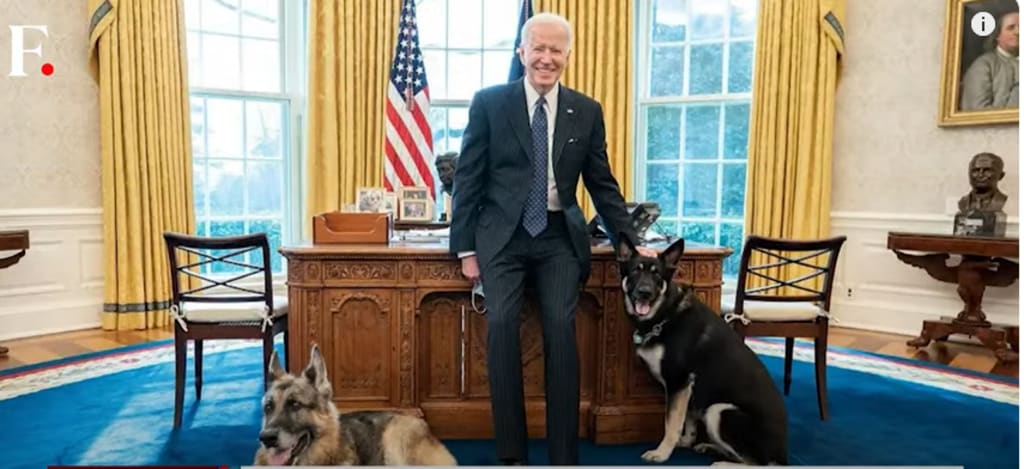US President Joe Biden’s Dog "Commander" Bites Secret Service Agents 24 Times
US President Joe Biden’s Dog "Commander" Bites Secret Service Agents 24 Times

Certainly, let's delve deeper into the story of Commander and the complexities surrounding pet ownership in the White House, as well as the broader implications it carries.
In the annals of White House history, the presence of pets has been a recurring theme, adding a touch of warmth and humanity to the corridors of power. From Abraham Lincoln's dog Fido to Franklin D. Roosevelt's beloved Scottish Terrier, Fala, these animals have often played pivotal roles in the lives of presidents and their families. However, the inclusion of pets in such a high-stakes environment comes with its own set of challenges, as evidenced by the saga of Commander, one of President Joe Biden's German Shepherds.
The story of the Commander's tenure in the White House begins with much fanfare and excitement. As the nation's "First Dog," he was expected to embody the virtues of loyalty, companionship, and obedience. Alongside his fellow canine companion, Major, Commander symbolized the Biden family's love for animals and their commitment to providing a nurturing environment even in the most demanding of circumstances.
However, what started as a promising chapter in White House pet history soon took a troubling turn. Reports began to surface of Commander exhibiting aggressive behavior towards White House staff, particularly the Secret Service agents tasked with protecting the President and his family. These incidents, characterized by nips and bites, raised concerns about the Commander's temperament and his suitability for life in such a highly regulated and security-conscious environment.
The frequency and severity of Commander's attacks prompted swift action from the White House staff and administration. Handlers and trainers were brought in to address the issue, employing a variety of techniques and strategies to modify the Commander's behavior. Yet, despite their best efforts, the biting incidents persisted, creating a climate of tension and unease within the White House walls.
The situation reached a critical juncture when it became clear that the commander's pre the commander'ssence posed a significant risk to the safety and well-being of those around him. Secret Service agents, tasked with protecting the President at all costs, found themselves in the line of fire, facing the threat of injury or harm from a member of the First Family's own household. The decision to rehome Commander was not taken lightly but was deemed necessary to mitigate the potential risks and ensure the continued effectiveness of the Secret Service's protective measures.
The emotional toll of parting ways with a beloved pet cannot be overstated, especially for a family as devoted to animals as the Bidens. The decision to send Commander to live with relatives was undoubtedly a painful one, tinged with sadness and regret. Yet, it was also a testament to the Bidens' commitment to prioritizing the safety and well-being of those under their care, both human and animal alike.
As Commander settles into his new home, questions linger about what could have been done differently to prevent the escalation of his aggressive behavior. Could earlier an intervention have made a difference? Was the training regimen sufficient to address his underlying issues? These are complex and nuanced questions, reflective of the multifaceted nature of pet ownership and the challenges it entails, particularly in a high-profile setting like the White House.
Beyond the personal implications for the Biden family, Commander's story also raises broader questions about the responsibilities that come with pet ownership, regardless of one's station in life. The bonds between humans and animals are profound and enduring, but they also require nurturing, patience, and understanding. In the glare of the political spotlight, these bonds are magnified, subjand ect to intense scrutiny and judgment from the public and the media alike.
In the final analysis, the story of Commander serves as a poignant reminder of the complexities of pet ownership and the enduring power of the human-animal bond. While his time in the White House may have been fraught with challenges and setbacks, the lessons learned from his tenure will undoubtedly inform future decisions regarding pet ownership and management, not only in the hallowed halls of power but in households across the country and around the world.
About the Creator
MESHACK LANGAT
Passionate storyteller & wordsmith, exploring life's narratives & finding inspiration in literature, art, & culture. Join me on a journey through the power of words as we connect, inspire, & create.





Comments
There are no comments for this story
Be the first to respond and start the conversation.